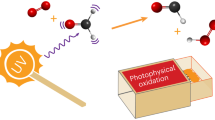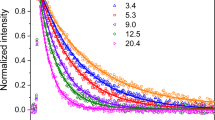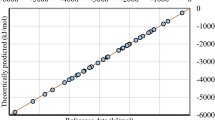Abstract
THERE has been much discussion and experiment about the question whether the thermal decomposition of various organic vapours under prescribed conditions occurs predominantly by way of free radicals or not. For the decomposition of acetone in a reaction of measurable rate in the neighbourhood of 500°–630°, all the existing evidence is against the radical mechanism, except that advanced by A. O. Allen1, who found that on reducing the reaction temperature to 462° an ‘induction period’ was observable. He regarded this as evidence for the existence of chains which required time to develop.
This is a preview of subscription content, access via your institution
Access options
Subscribe to this journal
Receive 51 print issues and online access
$199.00 per year
only $3.90 per issue
Buy this article
- Purchase on Springer Link
- Instant access to full article PDF
Prices may be subject to local taxes which are calculated during checkout
Similar content being viewed by others
References
J. Amer. Chem. Soc., 58, 1052 (1936).
Author information
Authors and Affiliations
Rights and permissions
About this article
Cite this article
DAVOUD, J., HINSHELWOOD, C. Thermal Decomposition of Acetone. Nature 144, 909–910 (1939). https://doi.org/10.1038/144909a0
Issue Date:
DOI: https://doi.org/10.1038/144909a0
Comments
By submitting a comment you agree to abide by our Terms and Community Guidelines. If you find something abusive or that does not comply with our terms or guidelines please flag it as inappropriate.



